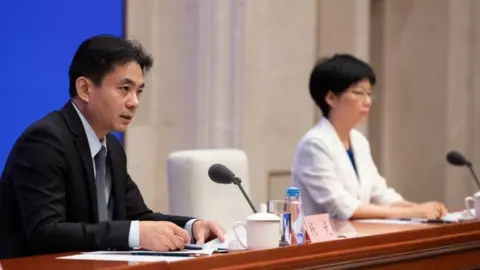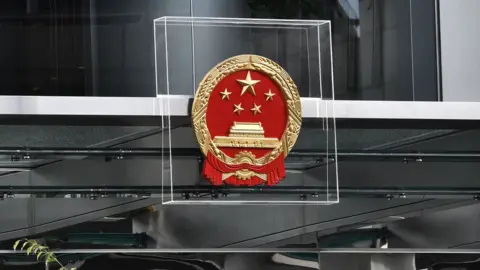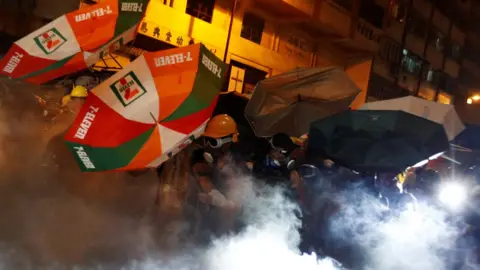Hong Kong protests: China condemns 'horrendous incidents'
China has condemned the recent anti-government protests in Hong Kong as "horrendous incidents" that have caused "serious damage to the rule of law".
A spokeswoman for China's top policy office on Hong Kong insisted that the territory's "top priority" was to "restore social order".
The comments marked a rare intervention by the Hong Kong and Macau Affairs Office [HKMAO].
The city has seen eight consecutive weekends of anti-government protests.
There were violent clashes on Sunday as police fired tear gas and rubber bullets at protesters. Barricades were also erected at several different locations in the city.
Although authorities in Beijing have condemned the protests and reiterated their support for Hong Kong's leader Carrie Lam on several occasions, Monday's intervention is widely seen as conveying the official views of China's top leadership on the civil unrest for the first time.
What did China say?
A spokesman for the HKMAO, Yang Guang, condemned what he called the "evil and criminal acts committed by the radical elements" in Hong Kong.
"We call on the general public of Hong Kong to be aware of the grave nature of the current situation," he said at the news conference.
 EPA
EPASpokeswoman Xu Luying added: "We also believe that Hong Kong's top priority... is to punish violent and unlawful acts in accordance with the law, to restore social order as soon as possible, and to maintain a good business environment."
The office also:
- Reiterated that the Chinese government "strongly" supports the leadership in Hong Kong
- Called on the people of Hong Kong to "unequivocally oppose and resist violence"
- Expressed support for the city's police force
- Blamed the escalating tensions on "irresponsible figures in Western countries" who are hoping to "contain China's development"
The intervention came a week after protesters defaced the highly symbolic national emblem on the Chinese government's liaison office in Hong Kong, prompting fury in Beijing.
The authorities have now installed a protective casing around the sign.
As a former British colony, Hong Kong has its own legal and judicial systems, and has been promised "a high degree of autonomy" from the Chinese government except in foreign and defence affairs.
 AFP
AFPClaudia Mo, a Hong Kong legislator who supports the protest movement, said Beijing's latest comments could provoke further unrest.
"I'm so worried what happened in Beijing today [will] actually help fan the fire," she told the BBC. "The way they say they resolutely... support Carrie Lam and the police force. They are trying to divide Hong Kong."
Bruce Lui, a senior journalism lecturer at the Hong Kong Baptist University, said he could not recall a news conference on Hong Kong being called by the HKMAO.
"Beijing is repeating what it has said before. It condemns violence, supports Carrie Lam and Hong Kong police," he told the BBC. "But when asked about the deployment of China's People's Liberation Army (PLA) troops, the spokesperson showed a rather distant attitude."
Although PLA troops are stationed in Hong Kong, they are not expected to interfere in local issues. But the law does permit Hong Kong's government to request assistance from the PLA for the purposes of maintaining public order or disaster relief.

China's two-pronged strategy
 AFP
AFPAnalysis by Celia Hatton, BBC News, Beijing
Beijing seems to be trying to get a grip of the turmoil in Hong Kong with a two-pronged strategy.
It is sharing its views on why the territory's residents are protesting, blaming a small number of "radicals" who are influenced by overseas forces. But it is also trying to maintain some distance by reaffirming its support for the authorities there.
The spokespeople continually praised the actions of the "courageous" police. The one question that was quickly batted away in the news conference was a query about the possible intervention by Chinese forces.
At times they sounded conciliatory. They also expressed support for Hong Kong's unhappy youth, noting that more needed to be done to provide affordable housing and employment.
But much more time was focused on Beijing's reasoning for what has gone so wrong. The officials repeatedly blamed "irresponsible figures" in the West. They also said that many in Hong Kong support the territory's chief executive, Carrie Lam, although they said those individuals are "relatively quiet".
It seemed that Beijing was not even bothering to win over sceptics in Hong Kong. Instead, this press conference repeated views already found in China's state media. This kind of media outreach was new - but the viewpoints don't appear to have changed.

How did we get here?
Demonstrations began when the Hong Kong government introduced a controversial bill that would have enabled extraditions to mainland China.
It sparked huge protests as critics feared the bill would undermine Hong Kong's freedoms, and be used to target political activists.
The row intensified as police were accused of using excessive force on anti-extradition bill protesters.
 Reuters
ReutersTensions increased further last Sunday, when suspected triad members descended on a subway station in Yuen Long, beating protesters, passersby and journalists with sticks.
Demonstrators accused the police of colluding with the triads - claims denied by the police.
The authorities say they have arrested 12 people over the attack, including nine men with links to triads.
The anti-extradition protests have morphed into a broader movement.
While the government has paused work on the extradition bill, protesters now want it withdrawn completely, as well as an independent inquiry into police violence, and democratic reform.
They want the territory's leader, Carrie Lam, who is not directly elected by voters and whose handling of the crisis has been widely criticised, to resign.
Some protesters have also expressed their anger at the mainland Chinese government, which they say has been eroding freedoms in Hong Kong.

Timeline of events 2019
3 April - Hong Kong government introduces amendments to the city's extradition laws to the legislature that would allow criminal suspects to be extradited to mainland China.
9 June - In the first of many protests against the changes, an estimated one million people march to government headquarters.
12 June - Anti-extradition bill protesters block roads and try to storm government buildings - police fire tear gas, rubber bullets and bean bag rounds at protesters, in the worst violence the city has seen in decades.
15 June - In a dramatic reversal, Hong Kong leader Carrie Lam indefinitely delays the bill.
16 June - Despite the delay, an estimated two million people take to the streets demanding the complete withdrawal of the bill, as well as an investigation into alleged police violence and Carrie Lam's resignation.
21 June - As anger grows towards police, protests blockade police headquarters for 15 hours. They now also want protesters that were arrested to be exonerated.
1 July - On the anniversary of Hong Kong's handover from the UK to China, the Legislative Council (LegCo) building is stormed and broken into by protesters.
21 July- Protesters deface China's Liaison Office in Hong Kong. That same night mobs of men wearing white shirts attack protesters and commuters in Yuen Long station, near mainland China, in a new escalation of violence.

